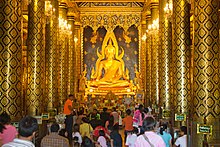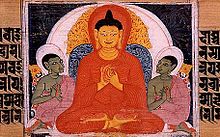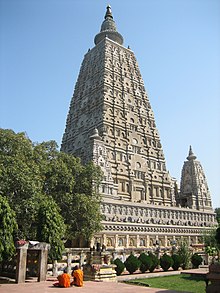Talk:Buddhism
Latest comment: 8 years ago by 79.78.153.70 in topic v in PTS references does not mean verse






Sourcing?
edit- Please source your quotations. Including the name of the author is not all that helpful (although it is better than nothing). If at all possible, include the name of the author, the name of the text, and a brief description of the context, especially if the source is a commentary or an academic work (and not a Buddhist primary source itself).
- Preferably, this article would separate primary sources (i.e., texts intended to be Buddhist teachings) and secondary sources (i.e., texts about Buddhism, commenting on Buddhism). But, considering the enormity of the current article and the lack (in most places) of any sort of reference that would lend itself to verification and proper sourcing, I am at a loss as to where to begin. Help? tartaruga 17:52, 24 December 2006 (UTC)
- I messed it up!!!!! i sowiee, someone fix it please.
Cleanup
editI've done a little work on arranging and formatting the quotes. There is a lot more that needs to be done which I'll try to get to as time permits. I have to go offline for a bit and didn't want anyone to think I'm satisfied with the present page. This is a quoteworthy subject and one I'm interested in, I'll see what I can do... --Bradeos Graphon 01:05, 20 March 2008 (UTC)
Unsourced
edit- Like it or not, if you look at your own mind you will discover it is void and groundless; as insubstantial as empty space.
- Buddhists believe that all human sufferings and dissatisfactions stem from desire or "thirst" (trishna) — for possessions , sensual pleasures, power, even for wisdom and knowledge—which warps our minds and distorts our understanding. The Buddha compared a life governed by the delusions of trishna to a river in flood, sweeping us away to a life of constant discontentment. Learning how to control our cravings is the raft that can carry us over the flood to the opposite shore of insight and peace of mind.
- Sow a thought and reap an act
Sow an act and reap a habit
Sow a habit and reap a character
Sow a character and reap a destiny
- In criticizing, the teacher is hoping to teach. That's all.
- Bankei [citation needed]
- The true meaning of the precepts is not just that one should refrain from drinking alcohol, but also from getting drunk on nirvana.
- Bassui [citation needed]
- All know the Way, but few actually walk it.
- If you don't find a teacher soon, you'll live this life in vain. It's true, you have the buddha-nature. But without the help of a teacher, you'll never know it. Only one person in a million becomes enlightened without a teacher's help. If, though, by the conjunction of conditions, someone understands what the Buddha meant, that person doesn't need a teacher. Such a person has a natural awareness superior to anything taught. But unless you're so blessed, study hard, and by means of instruction you'll understand. [citation needed]
- Mindfulness is the aware, balanced acceptance of the present experience. It isn't more complicated that that. It is opening to or receiving the present moment, pleasant or unpleasant, just as it is, without either clinging to it or rejecting it.
- Sylvia Boorstein [citation needed]
- You can explore the universe, looking for somebody who is more deserving of your love and affection than you are yourself, and you will not find that person anywhere. [citation needed]
- A brahmin once asked the Blessed One: "Are you a God?" "No, brahmin," said the Blessed One. "Are you a saint?" "No, brahmin," said the Blessed One. "Are you a magician?" "No, brahmin," said the Blessed One. "What are you then?" "I am awake." [citation needed]
- Do not try to become anything.
Do not make yourself into anything.
Do not be a meditator.
Do not become enlightened.
When you sit, let it be.
What you walk, let it be.
Grasp at nothing.
Resist nothing.
- If you haven't wept deeply, you haven't begun to meditate.
...
The only reason we don't open our hearts and minds to other people is that they trigger confusion in us that we don't feel brave enough or sane enough to deal with. To the degree that we look clearly and compassionately at ourselves, we feel confident and fearless about looking into someone else's eyes.- Pema Chodron [citation needed]
- The beauty of life is, while we cannot undo what is done, we can see it, understand it, learn from it and change so that every new moment is spent not in regret, guilt, fear or anger but in wisdom, understanding and love.
- Jennifer Edwards [citation needed]
- To deny the reality of things is to miss their reality;
to assert the emptiness of things is to miss their reality.
The more you talk and think about it, the further astray you wander from the truth.
Stop talking and thinking and there is nothing you will not be able to know.
- Although gold dust is precious, when it gets in your eyes, it obstructs your vision.
- ... And the other half is taking complete personal responsibility for getting there!
- Humans prepare for the future all their lives, yet meet the next life totally unprepared.
- When one does what Buddhas do, one is a Buddha.
When one does what Bodhisattvas do, one is a Bodhisattva.
When one does what Arhats do, one is an Arhat.
When one does what ghosts do, one is a ghost.
These are all natural phenomena.
There are no shortcuts in cultivation.- Venerable Master Hsuan Hua [citation needed]
- Our lives are based on what is reasonable and common sense;
Truth is apt to be neither.- Christmas Humphreys [citation needed]
- If you live the sacred and despise the ordinary,
you are still bobbing in the ocean of delusion.
- I prefer Buddhism because it gives three principles in combination, which no other religion does. Buddhism teaches prajna (understanding as against superstition and supernaturalism), karuna (love), and samata (equality). This is what man wants for a good and happy life. Neither god nor soul can save society.
- Bhimrao Ramji Ambedkar, Indian scholar, nationalist, jurist, political leader, Buddhist revivalist and an architect of the Indian Constitution [citation needed]
- Sometimes one creates a dynamic impression by saying something, and sometimes one creates as significant an impression by remaining silent.
- H.H. The 14th Dalai Lama
- Suttas are not meant to be 'sacred scriptures' that tell us what to believe. One should read them, listen to them, think about them, contemplate them, and investigate the present reality, the present experience with them. Then, and only then, can one insightfully know the truth beyond words.
- Venerable Sumedho [citation needed]
- Of the great religions of history I prefer Buddhism, especially in its earliest forms because it has had the smallest element of persecution.
- Bertrand Russell, British philosopher, logician, mathematician, historian, advocate for social reform, and pacifist [citation needed]
- Hinduism and Buddhism offer much more sophisticated worldviews (or philosophies) and I see nothing wrong with these religions.
v in PTS references does not mean verse
editPlease take care not to mistake the roman numeral v (meaning volume 5) for an abbreviation for "verse", as someone apparently did with a Samyutta reference.79.78.153.70 13:53, 17 April 2016 (UTC)